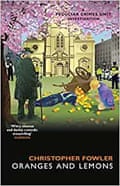 |
| Christopher Fowler: ‘I get really lost in that world, I have to be dragged out.’ |
Bryant & May author Christopher Fowler: ‘Writing the end was really emotional’
After 20 outings, the unconventional detective duo of Arthur Bryant and John May have solved their last case. But their creator is not willing to let them go entirely …
Suzi FeaySaturdady 10 July 2021
Christopher Fowler is picking at a healthy-looking bowl of protein and veggies. “I don’t have much appetite these days.” For the last two years he has been having cancer treatment, but remains upbeat. Lunch over, we move to the other end of his penthouse flat in London’s King’s Cross, where a floor-to-ceiling bookshelf houses a vast collection of London esoterica. Outside on the terrace, the large, shiny model of Marvel superhero the Silver Surfer that used to stand guard is gone. “He got frostbite and his fingers fell off. He couldn’t handle King’s Cross, let alone the depths of space.” A wide sweep of the skyline takes in the London Eye to the Shard, and far beyond.
This month London Bridge Is Falling Down, Fowler’s 20th Bryant & May crime novel, will be published, bringing to a close a much-loved series that started in 2003 with Full Dark House. The books feature the unconventional detective duo Arthur Bryant and John May of London’s Peculiar Crimes Unit, who solve arcane murders whose occult significance baffles more traditional detectives. Crime fiction aficionados can amuse themselves by spotting references to classics of the golden age, whose plots and twists Fowler ingeniously projects on to the era of computers and mobile phones. Everyone else can enjoy the endlessly bantering and discursive dialogue between the pair as they break all procedural rules, and the uniquely droll narrative voice with its sharp-eyed slant on modern life.
In 2003 Fowler was established as a writer predominantly of horror, with forays into black comedy and satire based around his day job in film marketing. Full Dark House was meant to be a standalone, which is why Fowler kills Bryant off in the first few pages with an explosion that destroys the PCU offices, about 60 years after his heroes first met as youngsters during the blitz. That first novel is set mostly in wartime flashback around the Palace theatre at Cambridge Circus, where a Phantom-like murderer uses air raids as a cue to run amok among the gantries.

The duo’s further adventures involve such site-specific elements as Punch and Judy shows, forgotten London rivers, Victorian boozers, the nursery rhyme “Oranges and Lemons” and, in the latest book, models of London Bridge. Fowler is clearly obsessed with the capital – was he worried the series might only appeal to those similarly inclined?
“I think everybody likes walking through London in their mind, and because it has so many literary connotations, London is already slightly blurred with fiction. I expected that I was writing very parochially for a very limited audience, and it turned out that what I was doing was the reverse – the more abstract, strange and esoteric I became, the more people liked it. I was going to finish at book six but it got a groundswell of very loyal – strangely loyal – fans.”
At this point sales also began to pick up in the US. “I’ve had a few complaints over the years – one from a Republican senator who complained it was ‘too deep English’ for him. But I’ve been lucky to have a couple of editors in New York who were absolutely brilliant. Their attitude was, don’t change a word.”
With a few exceptions – Hall of Mirrors is set in the 1960s – the detecting duo are of pensionable age. Bryant in particular crumbles away from book to book, wearing dentures and walking with a stick. Isn’t there a technical challenge with starting off with such aged characters?
“One of the curses of having an old guy is that you can only get away with having so many health scares. But it only gets tricky if you assume that fictional characters age like human beings! Why should the Simpsons age? It’s a ridiculous idea!”
May, slightly younger and much more charming, compensates for Bryant’s more abrasive style. Cross-grained, eccentric, erudite, he is steeped in London lore and apt to make bizarre connections and mental leaps that would faze anyone else. To what extent does Bryant resemble his creator?
“I am not Arthur Bryant.” At this point Fowler’s husband, Pete, a TV executive, appears in the background and mouths: “Oh yes he is!” Fowler pauses. “A little bit of me is, but I haven’t got that cantankerous … fuck off!” He jerks his thumb at Pete, laughing. “Someone who hasn’t read the last four books.”
Over the last couple of years, ill health has forced Fowler into different working practices. He worked on London Bridge Is Falling Down while receiving chemotherapy at University College Hospital. “It was great, they set me up with a desk. Yeah, yeah, just carried on with a thing in my arm. Who cares? And then I decided to bring [the series] to a definite stop. I cannot pull another Bobby Ewing!’
I ask if the cancer diagnosis had some bearing on his decision to wind things up. “It’s subconscious, but by book 18 I’d started adding details that would eventually dovetail the 20th book back to the first, completing a circle. I couldn’t even see it, that’s the weird thing. When I delivered it, my agent said: ‘I think you’ve been approaching this for a long time.’ I’d packed it with little things that were pointers back to the earliest books. Right towards the end, I didn’t quite have the last link of the story until I realised – it’s obvious. It’s a thing that happened at the start.”
It must have felt strange, to say goodbye after all these years. “People say, do your characters live with you all the time? No – they live with me when I sit down [to write]. I open the lid on the laptop, that’s the only time I think about them. Then I get really lost in that world, I have to be dragged out. The rest of the time they’re not living with me. But the characters are so clear in my head that writing the end was really emotional. I really did feel it was like losing family members, because my parents read the books and loved the characters and my parents are both gone, so …”

After a moment, he picks up again. “That’s probably why I did two volumes of memoirs in the middle of the series [Paper Boy and Film Freak], because Bryant’s memories are so churned up with my parents’ memories of London. It stirred up enough stuff to make me think I should actually do their story as well. They both lost their teenage years to the war: my mum joined the Women’s Auxiliary Air Force and my dad was a firewatcher at St Paul’s.”
London Bridge Is Falling Down is not the last we’ll hear from Bryant and May. In Bryant & May’s Peculiar London, coming out next year, characters from the series simply wander around the city having conversations about places they love. “I wanted to make it a really chatty, cheeky, irreverent, messy series of arguments about London. I delivered it thinking they’re never going to accept this, and the publishers went: ‘Oh we love it – it’s like a Bryant & May book without bodies in it!’”
Of course London has moved on inexorably since Fowler began his writing career, and co-founded his film marketing company the Creative Partnership at the age of 26. Soho is not the international film hub it once was, in the heady days when the company was working on 15 films a month, including marketing campaigns for Reservoir Dogs and Trainspotting. One of Fowler’s claims to fame from the time is mentioned in Film Freak. “Asked to provide poster straplines for Alien, I wrote several pages of them, including ‘In space no one can hear you scream’. I assume I wasn’t the only person to think of this – it’s an obvious line,” he writes.
“Someone else laid claim to it this month, I noticed,” he says now. “I love it! But we worked on it first, because it was shooting in the UK. Ridley Scott came to see us and gave us a drawing of an egg and said: ‘That’s really all I can tell you – and it’s going to be very frightening.’ We used to get paid £20 per page of copylines and that was the one they went with.”
For years he shuttled between the Cannes film festival and the Frankfurt book fair, twin poles of his existence. Though the company still exists in slimmed-down form, he retired 15 years ago. “The business model changed dramatically. Once everything went digital, America didn’t really need a London outpost. There are hardly any screening rooms left in Soho now. All these places I spent half my life in.”
The question mark over his health means that by the time the Peculiar London book comes out next July, he might, as he drily puts it, not be “available for the tour”. Given that during our interview he comes up with two new book ideas and is currently putting the finishing touches to a fantasy novel, the prognosis isn’t slowing him down. However, we finish on a melancholy note, discussing how many of his short stories over the years describe a London that has now gone. His film anecdotes, too, evoke a vanished world, one where you could take George Hamilton to Bruno’s Sandwich Bar in Soho or get the concierge at the Athenaeum Hotel to put you through to any visiting star. But Fowler’s voice is growing hoarse and it’s time to stop for a coffee.
On the way home, I peek at my copy of the final Bryant & May mystery. He has inscribed it with the characteristically jaunty words: “The Big Finish!”

No comments:
Post a Comment